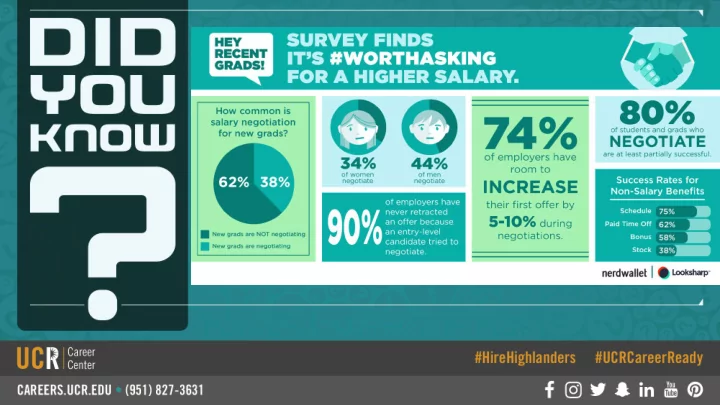

YOUR CONTENT CAN GO IN THIS AREA
YOUR CONTENT CAN GO IN THIS AREA
778 STUDENTS were selected for on-campus interviews
YOUR CONTENT CAN GO IN THIS AREA
What’s My Worth? Evaluating Job Offers and Salary Negotiation
Agenda The Parts of an Offer Letter Benefits The Process of Salary Negotiation Multiple Offers Reneging on an Offer The Impact of Your Job Leave Your Mark Demo Questions
What to Look for in an Offer Letter June 1, 2016 June 1, 2016 Position Title Start Date 2016. Salary Benefits Conditions Response deadline
The Parts of a Job Offer - Benefits Sign-on Bonus Tuition/Student Loan Reimbursement Relocation Expenses Overtime Salary Progression Commuting/Parking Reimbursement Medical/Dental/Optical Insurance Employee Perks Life/Disability Insurance Flexible Hours Vacation/Sick/Personal Days Telecommuting Retirement Plans Technology Profit Sharing/Stock Options Professional Development
Knowing when to negotiate Do you need to negotiate? ◦ Are you completely entry level? ◦ Is the offer reasonable? When NOT to Negotiate ◦ Highly structured jobs ◦ Jobs with a known salary ◦ Jobs with an undifferentiated applicant supply
Compensation types you might see in the job description/application: ◦ TBD ◦ DOQ ◦ Base + Commission ◦ Commensurate with Experience ◦ Monthly Stipend
The Art of Salary Negotiation Step 1: Do Your Research Step 2: Let the Employer Make the First Offer Step 3: Review the Offer Step 4: Prepare a Counter Offer
Do Your Research: Know Your Worth Use online resources to find salary ranges Think about your education, unique skills, and experiences
Do Your Research: Know Your Worth Consider position, location, size, and industry of the company Industries with the highest levels of employment in accountancy: Percent of Annual Industry Employment industry mean employment wage Accounting, Tax Preparation, Bookkeeping, and Payroll 325,930 33.97 $83,710 Services Management of Companies and 97,500 4.11 $80,020 Enterprises Local Government 46,170 0.84 $68,030 State Government 41,520 1.91 $63,920 Management, Scientific, and 40,370 2.80 $82,410 Technical Consulting Services Source: Bureau of Labor Statistics, bls.gov
Let the Employer Provide the First Offer • Leave it blank • “Negotiable” • Provide range
During the Interview • “I’ll consider any reasonable offer.” • “I’d like to discuss the job first. I need to know whether I’m the right fit and that you’re offering me the job.” • “I’m very interested in the job and the company, but it depends on the offer – I’d be glad to respond to a specific offer.”
During the Offer • “You know better than I what this job is worth.” • “My research tells me that someone with my skills, education, and qualifications doing this job earns between ____ and ____ with a median salary of ____. What’s your offer?”
Prepare a Counter Offer Aim for a target salary that is realistic Be explicit in your request Use the research you have done and have hard evidence to support your request Consider non-monetary benefits when negotiating Know your bottom line, and be prepared to say no if the employer cannot meet your needs Remember to consider gross vs. net income
Do’s and Don’ts in Negotiating Do Don’t ◦ Be positive ◦ Be the first to name a figure ◦ Be persuasive ◦ Assume the first offer is the final offer ◦ Be flexible ◦ Be demanding ◦ Be confident ◦ Be pushy ◦ Base your negotiation on ◦ Be unrealistic competitive market value ◦ Explain how you will contribute to ◦ Share personal information the employer’s profitability ◦ Forget to consider other benefits in the negotiation process
Multiple Offers Think about your values and interests ◦ Position ◦ Company ◦ Industry Consider all options to make the best decision for you ◦ Salary ◦ Location ◦ Work-Life Balance ◦ Company Culture ◦ Long-Term Goals
Need More Time to Consider an Offer? Ask to meet with other key colleagues you didn’t meet in the interview Ask for time to discuss the offer with your family and friends so that you can make the best decision for you Be open with employers when given one offer and in the interview process for another position
Reneging on an Acceptance The Career Center does NOT endorse reneging Make sure that the new offer is of enough significance that it is worth potentially burning a bridge If you choose to renege, do so respectfully – don’t ghost the employer There are situations where it is acceptable to renege Bottom Line: You should never accept one offer with the intention of reneging if a better opportunity comes along.
Leave Your Mark Tell us about your post-grad plans! The Career Center uses information like job title, company, location, and salary to ◦ Show the overall value of a UCR degree ◦ Show your professors, deans, and advisors what you are up to after graduation ◦ Compile information used in a national snapshot of recent graduates’ activity and prospects
Where Can You Find Us? Location: We are located in the Career Center Plaza. Our entrance is the University Lecture Hall and the Surge Building, behind the UCR Campus Store. Hours: Mon. - Fri. 8 am to 5 pm except Wed. 9 am to 5 pm Web Site: careers.ucr.edu Individual counseling appointments available by calling: (951) 827-3631 Drop-In Hours: Mon. - Thurs. 10 am-3pm Fri. 10 am-12 pm
Recommend
More recommend